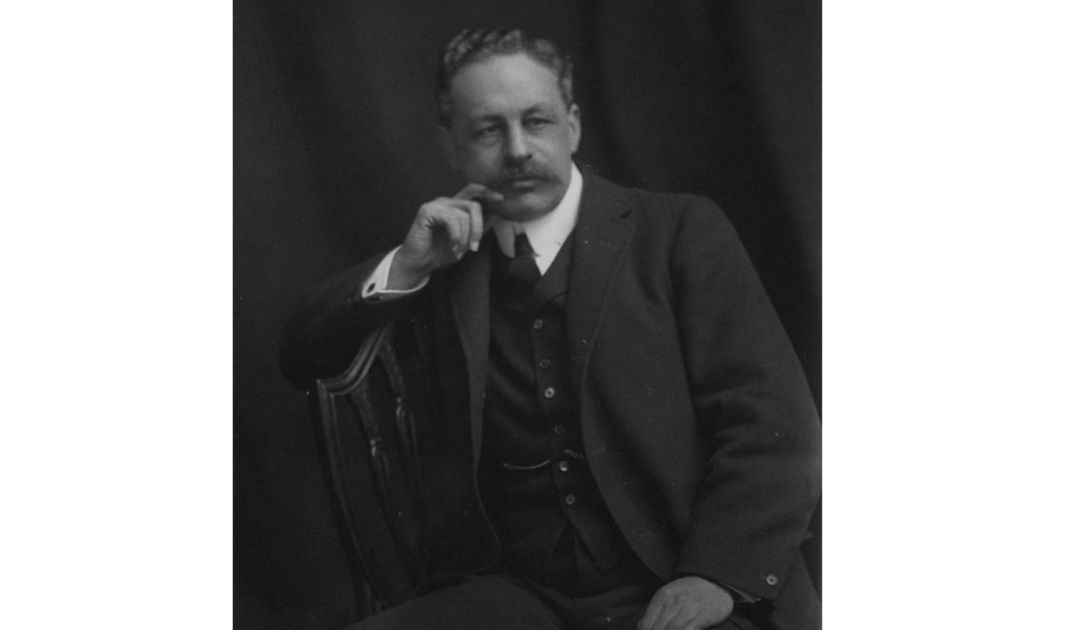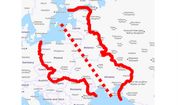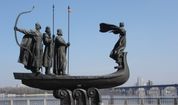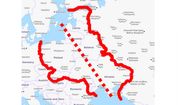Mackinder. Part 1

(wikipedia.org)
But this is not the basic reason why one should become well acquainted with his views and activities in the context of Poland. This should be done primarily because political leaders in the region think in terms of Mackinder theses. Especially those born and raised under the repressive continental Soviet empire, and their mental maps were shaped by the theses of the famous Englishman.
During the communism they were treated as “imperialist” ideas, as contradicting the Marxist doctrine, and of low scientific value. In recent years, they are slowly beginning to reemerge in the debate.
Furthermore, policy makers in the United States’ responsible for Eurasia and Central and Eastern Europe, are thinking along the lines of Mackinder and Spykman – especially Spykman’s emphasis on the priority of the Rimland area in Eurasia for successful American policy.
Equally importantly – they also know how his views are well received by decision-makers in Poland and throughout our region, always fearing the pressure of the continental land empire from the east.
That is why, among other things, they know perfectly well how to talk to people responsible for geostrategic decisions in Poland and how to distribute the right accents in such conversations, all in order to achieve the goals of American policy.
Finally, Mackinder has the status of an intellectual icon for Russian geopolitical thought. It should certainly be acknowledged that people conceptualising Russia’s contemporary geostrategy have a good understanding of Mackinder’s teachings. The Russians recognise the validity of Mackinder’s theories and they are much more popular in Russia than in Poland. Numerous works on, for example, Eurasianism, allude to Mackinder’s theories, which are seen as justifying the capture of a large part of the Eurasian continent by the Russian Empire and then the Soviet Union as an unfamiliar historical necessity, and the revealed historical process of centrifugal expansion from the Heartland, developed according to universal assumptions formulated by Mackinder. Russia’s imperial policy during Putin’s time found a clear ideological justification in them.
“Who rules East Europe commands the Heartland;
who rules the Heartland commands the World-Island;
who rules the World-Island commands the world.”
Mackinder’s famous passus was to be whispered into the ears of politicians, always according to such rules that they remembered and never forgot about it. Mackinder sketched the “equation” immediately after the end of WWI military operations on the Western Front in a particular context. He was afraid that a consolidated Germany defeated in the west of the continent had still won victory in the east by securing the Peace of Brest, after imposing defeat on Russia. From 1916 onwards, victorious Germany created a system of dependent countries in the east: Poland, Lithuania, Ukraine, Finland, Estonia and Latvia. Russia in Brest gave up all satellites and large parts of the internal empire, and the German army occupied areas of Central and Eastern Europe from the upper Dnieper in the north to the Don and the Caspian Sea (Baku) in the south.
The Western Entente seemed to be interested only in the west of the continent, so Mackinder was seriously afraid that the seapowers of the English-speaking world would lose the piece by ceding the east of the continent.
If the United States had not entered the war in 1917, it is not known what would have ended it. It can therefore be suspected that President Wilson’s plan to create independent states in the east of the continent (declared as the right to self-determination of nations) was a pure geostrategy, applied by the Anglo-Saxons, aimed at creating a wedge against the potential of Germany’s domination in the east, or aimed at preventing Germany’s continental cooperation with Russia – any Russia would after the war be lost by the Russian Empire. Therefore, the Brest peace for geopolitical minds could be treated as a kind of response to Wilson’s anti-German ideas. In turn, the answer to Brest was certainly the support of the Russian (anti-Red) White movement by the Western Entente, because the restoration of the Russian empire created the possibility of resuming the war with Germany, or at least suppressing the risk of increasing German power.
Mackinder clearly feared in the winter of 1919 that, in fact, Germany was in control of Eastern Europe, and that despite losing the war, if Berlin continued to dominate this area, it would be a step closer to world hegemony. He also believed that if the lands between Germany and Russia were left to their own fate, this was where a future world war would begin.
The way out was to separate Germany and Eastern Europe – as the main condition for the peaceful stabilisation of Europe. Mackinder claimed that this territory, separated from Germany and Russia, cannot be divided and must form a so-called Intermediate Sector (a Middle Tier), sharing the above powers. It was to cover the countries between the Baltic Sea, the Black Sea and the Adriatic Sea, jointly possessing the potential equivalent to each neighbours’ power, and as such they were theoretically capable at that time of halting their pressure. However, in order to properly fulfill their geopolitical functions as the main guarantor of peace, they must form a common system – at least an alliance. At the same time, this geopolitical construct required considerable political and material assistance from Western maritime powers.
In the context of Poland, Mackinder’s activity in our region of the world is of great emotional and intellectual significance. During World War I and immediately after it, he was used by the British authorities to carry out confidential political activities. One of the most difficult missions was the mission to Russia, to General Anton Denikin fighting in 1919 against the Red Army on the southern front. Mackinder was the high commissioner at the White Guard Army. In order to coordinate the activities of the Polish army and Denikin’s army, he was sent by the Russian general to Paris and Warsaw. First, he met Roman Dmowski in Paris, and then in Warsaw with Ignacy Paderewski and Józef Piłsudski.
Mackinder’s mission was described as follows by Pobóg-Malinowski: “The great British geopolitician Sir Halford John Mackinder, a high British commissioner for South Russia, came to Warsaw. He considered his main task to bring about an agreement between Piłsudski’s Poland and Denikin’s Russia. After a Paris meeting with Dmowski, Mackinder had two long talks with Paderewski in Warsaw and was received by Piłsudski in the Belvedere, along with the accompanying [Sir Horace] Rumbold and General Keynes, who was constantly at Denikin’s side. The head of state stated in an interview that he was not about to negotiate with the Bolsheviks (…) Piłsudski told me – later wrote Mackinder – that he thought as a military man that he could make a march to Moscow in May, but as a politician he added: ‘What will I do there when I get there?’ In response, Mackinder expressed his conviction that you can only march to Moscow in an “alliance with the Russians” – the Whites of course. From the Warsaw salon of the Chief of State, Mackinder left for Denikin’s quarters. A conversation with General Wrangl (…) deepened his conviction that Denikin could not defeat the Bolsheviks on his own. Mackinder in talks with Denikin, stating the weakness of his strength in relation to the enormity of the task, advised him categorically to look for allies primarily in Poland, but additionally in Finland, Estonia, Latvia, Georgia, Azerbaijan and Romania.”
Knowing the attitude of Józef Piłsudki to the anti-Bolshevik crusade, we know that Mackinder’s mission had to fail. In fact, the Polish authorities feared the victories of White generals, including Denikin himself. As a result, there was no military cooperation between anti-Bolshevik forces. Not only that – the offensive of Polish forces was stopped so as to facilitate the Bolshevik army to defeat Denikin. This was probably the result of a secret agreement reached between the Polish side and the Bolsheviks on November 3, 1919, which was to prevent Denikin’s victory. According to Norman Davies, in accordance with his instructions, Boerner informed Marchlewski that it was not in Poland’s interest to show help to Denikin and that, with the attack on Mozyrz in conjunction with Denikin’s attack on Orel, the Soviet southern front could be abolished once and for all.
Autor
Jacek Bartosiak
CEO and Founder of Strategy&Future, author of bestselling books.






Trwa ładowanie...